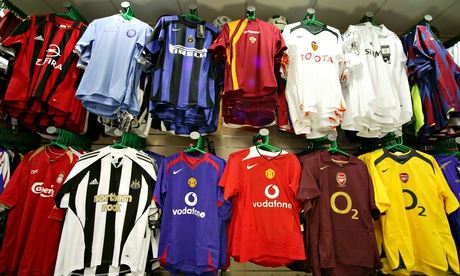 While football merchandise sells on a vision of good health, in Cambodia factory workers are struggling to get by. Photograph: Frank Baron for the Guardian
While football merchandise sells on a vision of good health, in Cambodia factory workers are struggling to get by. Photograph: Frank Baron for the Guardian
The World Cup represents a huge pay cheque for corporate sponsors – the chance to associate products with athleticism and global excitement. Official sponsor Adidas has kitted out both teams in the World Cup final, as well as officials, referees and volunteers. Screens will be filled with their logo and as such, Adidas predicts that it will make €2bn in football-related sales, in large part thanks to its association with the tournament as sports fans rush to buy merchandise.
But behind each football boot or shirt is an assembly line of garment workers in countries such as Cambodia who have crafted each item. Can they expect to receive any part of this €2bn windfall? Will they receive a bonus cheque for propelling Adidas to the top of the sports market?
While football merchandise sells on a vision of good health, in Cambodia factory workers are struggling to get by on wages so low that malnutrition and fainting fits are rife. The accepted number of calories needed for an adult to carry out a day’s labour is 3,000, yet research by Labour Behind the Label and the Community Legal Education Centre in Phenom Penh has shown that Cambodian garment workers are only able to afford an average of 1,598 calories a day – half the required amount.
The problem is that the minimum wage in Cambodia is just 25% of the living wage. A living wage is the amount needed to adequately cover food, rent, education, transport, healthcare and which allows for a small amount of savings to begin to break the cycle of poverty. It is a standard enshrined in the United Nations Universal Declaration of Human Rights. According to Tailored Wages (pdf), a report from the Clean Clothes Campaign, a living wage in Cambodia would be €285.83 whereas the minimum wage is just €72.64.
Jyrki Raina is the general secretary of global trade union IndustriALL, and believes brands can have an impact on the setting of wages by agreeing to pay higher prices for products. It is a concession that would only have a ‘fractional’ impact on the cost of each item for consumers. “We’ve been working intensely with around 30 brands, including Adidas,” Raina says. “We’re in negotiations with the Cambodian government, garment employers and unions to secure a process that moves people from poverty wages towards living wages.”
Adidas confirms that it is one of a number of brands working with IndustriALL, the list also includes H&M, Puma, and Inditex. “Our task as we see it is primarily to encourage and induce our suppliers to structure their salary system in a transparent manner, through regular dialogue about wages and social contributions, and to allow the employees to have direct input, ideally through wage negotiations,” explains Katja Schreiber, director of corporate communications at the Adidas Group. “Our objective is for our suppliers not only to comply with the legal regulations but to also take the cost of living into account, and to reward employees for increasing their productivity.”
But not everyone is convinced that Adidas plays fair. The Clean Clothes Campaign point to a recent article by Adidas CEO Herbert Hainer which stated that the increased cost of wages in China has prompted Adidas to grow production elsewhere. This kind of implied threat – by a corporation whose annual sales ($19.24bn) outstrips the GDP of a country like Cambodia ($15.25bn) – fuels the race to the bottom. The message to governments everywhere is clear – raise wages and we’ll leave.
Earlier this year strikes and protests calling for the minimum wage to be raised to $160, resulted in five garment workers being shot dead. Labour Behind The Label interviewed Van Piseth a garment worker and trade union organiser at the New Orient factory which supplies Adidas, for its Payfair Playfair project. Piseth told the organisation that the arrival of Adidas brought a certain amount of improvement with regards to safety conditions and workers’ rights but the lack of change to wages is what caused hundreds of thousands of people to take to the streets.
IndustriALL, along with its affiliate unions in Cambodia, is continuing to push for a minimum wage of $160 – one that would allow garment workers to afford enough food to be able to do their job.
The factories of Cambodia are a far cry from the $3.34m a year sponsorship deals Adidas signs with players like Argentina’s Lionel Messi. It is only fair that the workers who create the merchandise and generate the billions of pounds in profit are paid a wage that doesn’t mean starvation.
The fashion hub is funded by H&M. All content is editorially independent except for pieces labelled advertisement feature. Find out more here.
Join the community of sustainability professionals and experts. Become a GSB member to get more stories like this direct to your inbox